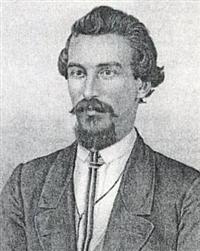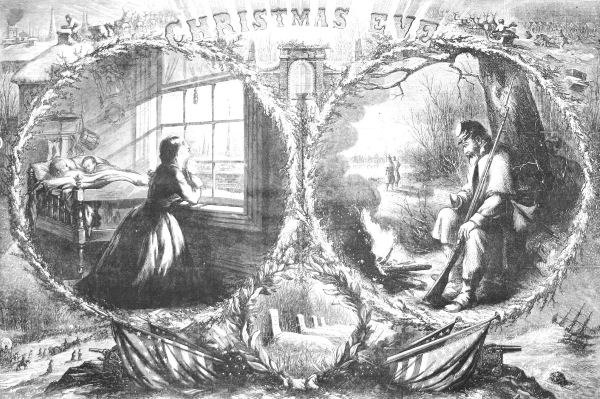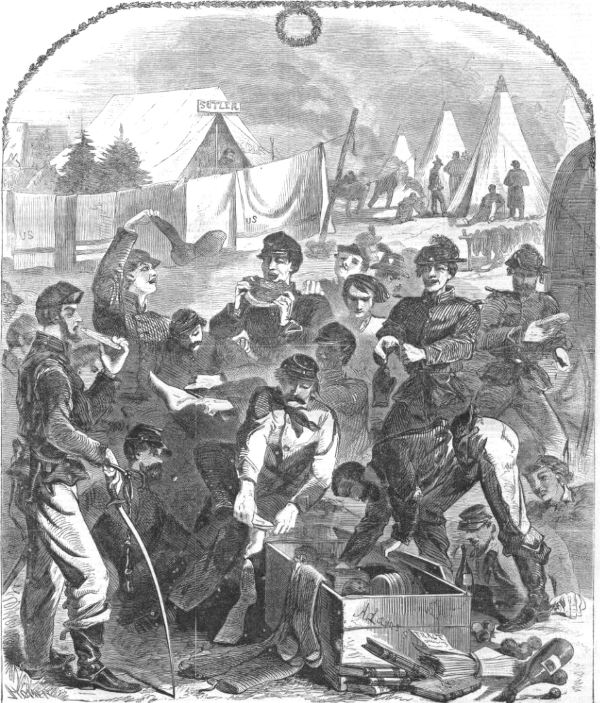Search:
Powered by
Website Baker
Christmas in the Third Louisiana Infantry |
| Posted by The Muse (themuse) on Dec 24 2014 |
 Even while at war, some men, far from home, were able to celebrate the holiday season. After the war, Sergeant Will Tunnard wrote about Christmas in camp with the Third Louisiana Infantry Regiment, as part of Brigadier General Ben McCulloch's Confederate Brigade.
Even while at war, some men, far from home, were able to celebrate the holiday season. After the war, Sergeant Will Tunnard wrote about Christmas in camp with the Third Louisiana Infantry Regiment, as part of Brigadier General Ben McCulloch's Confederate Brigade.
In 1861 after the Battle at Oak Hills (Wilson's Creek), McCulloch withdrew from Missouri into Arkansas, and the Third Louisiana went into winter quarters at Cross Hollows, about 7 miles southeast of Bentonville, Arkansas. Tunnard described the conditions of the Confederate encampment.
The quarters of the Louisiana Regiment were situated in one of the valleys of Cross Hollows, protected from the chilly, wintry winds by high, rocky hills, covered with a heavy growth of timber. They were substantial wooden buildings, constructed of tongued and grooved planks placed upright, with roofing of the same material. The flooring was the very best, and would have been a credit to the handsomest of private residences. Each building was 38 by 20 feet, divided into two rooms by a partition meeting in the center at the chimney, constructed of brick, with a fire-place in each room, with a smooth brick hearth. The privates’ quarters were in two parallel rows facing each other, while the officers ran perpendicular to them, forming a square at one end. The men were not too much crowded, and slept in berths placed one above the other, similar to those in a state-room of a river steamer. The utmost contentment and good feeling prevailed among the men, and all seemed determined to enjoy the days of the winter months. With abundant material for the purpose, they soon manufactured chairs, tables, shelves, and mantle-pieces over the fire-places. Most agreeably were they disappointed at their situation and surroundings. They soon gathered about them all those little comfort’s and conveniences which so materially contributed to the happiness of a soldier’s precarious existence. The buildings were soon named according to the inclination of the occupants, and a stroll through the quarters exhibited to the view grotesque lettering, telling of all kinds of “Dens,” “Retreats,” and “Quarters,” while you could easily discover “Bull Run,” “Leesburg,” “Belmont,” and other streets. “Manassas Gap” opening into “Capital Square,” the officers’ quarters.
 As Christmas approached, the Third Louisiana amused themselves in the snow.
As Christmas approached, the Third Louisiana amused themselves in the snow.
[On December 22] there was a heavy fall of snow. A scene of uproarious mirth ensued. There was a general “ducking” of all, irrespective of rank, and fierce battles with snow-balls. It was hazardous for anyone to venture in sight, as he would be most unmercifully pelted with snow …
Christmas Eve, the holiday festivities, and foaming bowls of egg-nog, with raw liquor, seemed as plentiful as the spring water nearby. Uproarious hilarity prevailed, the absent were toasted in many a cup, and songs sung with eventually discordant chorus. The next day was Christmas. Soldiers loved to dispense hospitality, consequently there were numerous gatherings of convivial spirits, and egg-nog was drank with all the éclat and formality of a drawing-room assembly, or hilariously tossed off with a jovial toast and upraised cups
Will Tunnard remembered toasts given in camp on Christmas Day
Our first Christmas in the Southern Confederacy. When bright-winged peace shall have dispelled the dark gloom of war, may we each sit down neath the shadow of his own vine and fig-tree to relate the incidents of the Western Campaign, remembering this as one of the most pleasant.
An admirer of himself abroad and the ladies at home, gave “Company K first in peace at home, first in war abroad, and first in the hearts of the ladies.” The conceited raga-muffin!
Permission having been obtained, during the morning one of [Franz] Sigel’s captured six-pounder pieces was dragged from the arsenal and made to thunder forth its deep-toned voice in honor of the occasion. When last we heard its tone it spoke only to proclaim the coming storm of death and ruin which it was sending amid battling hosts. Now it caused the hills and villages to re-echo in honor of the glad tidings borne from heaven to earth by angels pro claiming “Peace on earth, good-will to men.” Then its thunder proclaimed war; now it spoke of peace. How strange the contrast! The soldiers on duty were not forgotten, for some kind lady friends sent them a repast of all manner of dainties and substantial, and once again they feasted most sumptuously and royally. The festivities of the day ended in a large ball at the court-house, where assembled the beauty of Fayetteville the gay laddie and fair lassie who “tripped it on the light fantastic toe” until the “wee sma’” hours of the succeeding morn. The boys enjoyed their Christmas, although not greeted by the smiling faces and cheerful voices of “loved ones at home.”
 Three years later, the Confederacy was on the ropes as the Third Louisiana boys spent another Christmas at war. But they were back in Louisiana witering in Shreveport. The regiment had seen hard fighting at "Oak Hills," "Elkorn Tavern," Iuka," and "Corinth." But the regiment was not gonig to see any more fighting after Christmas 1864. Will Tunnard described life in camp during the holidays.
Three years later, the Confederacy was on the ropes as the Third Louisiana boys spent another Christmas at war. But they were back in Louisiana witering in Shreveport. The regiment had seen hard fighting at "Oak Hills," "Elkorn Tavern," Iuka," and "Corinth." But the regiment was not gonig to see any more fighting after Christmas 1864. Will Tunnard described life in camp during the holidays.
The monotony of camp was seldom disturbed during the winter months, save by some practical joke or foray at the expense of the poor conscript. The weather was unusually rainy and stormy, yet happy, very many happy hours were spent in those rough log-huts, despite storms without. Christmas Day, 1864, was a cloudy, raw, disagreeable one, yet the boys were early astir, and seemed disposed to enjoy the occasion to the full bent of their inclinations and means. Egg-nog seemed a prevailing beverage, while towards the dinner hour, various and sundry savory and unusual dishes were to be found in course of preparation.
At one tent, a party consisting of Major Richards, Lieutenants Emanuel, Company “C,” and Washburn, Company “B,” Sergeant F. D. Tunnard, Company “K,” Sergeant R. Brennan, Company “F,” Sergeant W. H. Tunnard, A. C. S. Department and Corporal J. R. Nash, Company “H,” sat down most cozily to dinner, consisting of a fine roast turkey, light bread and butter, potatoes, pies, cake and coffee. They enjoyed the repast most royally, laughing and chatting over their dinner, eaten from tin ware, as if it had been a regal feast, daintily prepared and partaken of from dishes of the most costly and exquisite porcelain. It was undoubtedly enjoyed as if such had really been the case.
Last changed: Dec 24 2014 at 9:06 AM
Back